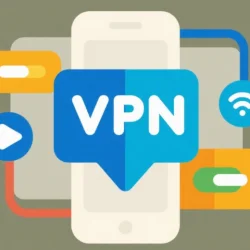How VPN Split Tunneling Works & Why You Should Use It

A VPN service has many benefits, but one of the most important is that it can provide you with a secure connection to the internet. The result is that you can access blocked websites and surf anonymously. However, when you use a VPN, your internet traffic is routed through a designated VPN server. This means that all your internet traffic will be directed through the VPN. But what if you only want to use the VPN for specific apps like Facebook or Netflix? In this case, you can use split tunneling.
What is VPN Split Tunneling
A VPN is one of the best solutions for protecting your privacy and security while browsing the Internet. In addition, VPNs can be used to access region-restricted content, like video streaming sites and social media. For example, people might use VPNs to watch Netflix programs for foreign countries. A Japan VPN allows you to access Japan-only TV shows.
However, there are some drawbacks to a VPN. One such drawback is that the VPN may slow down your connection speeds. Thankfully, there is an easy way to speed up your connections while still keeping the protection of a VPN: VPN Split Tunneling.
Split tunneling is a feature that routes specific apps through the VPN and others are not. It works by applying filters that allow traffic coming from different sources or destinations through either the internet connection or the private network connection. The VPN will then separate them into two connections for it to process.
Why You Should Use Split Tunneling?
Split tunneling is a solution to the problem of VPNs slowing down your internet connection. Split tunneling allows you to choose which traffic will go through the VPN, and so it doesn't slow down your other downloads or browsing. So if you want fast access for Netflix but speedy Google searches too, then split tunneling could be just what you're looking for! It's also perfect if you don't need total anonymity as well - with this service, nobody can see where all of your data travels from one end point to another by splitting up that information into two separate streams - one encrypted and secure on its way across the public network (VPN), and an unencrypted stream headed elsewhere: either out onto public Wi-Fi (unless using OpenVPN) or directly back out again over regular Internet connections outside of any encryption used by said VPN provider.

There are many reasons for using VPN split tunneling. For example, it might allow you to use a VPN in order to access office resources remotely while still allowing you to watch a YouTube video that doesn’t require a VPN connection.
For many VPN users in China, the man reason for using VPN is to visit blocked websites such as Google, YouTube, Facebook etc. A good VPN for China can serve this purpose. However, the user might also need to access local websites that are not blocked. If they always connect to a VPN, the speed for using not-blocked software or apps will be much more slow. In this kind of situation, the user can turn on split tunnelling and create a filter so that while some software/app will go through VPN traffic, the others will not.
What are the best VPNs for Split Tunneling?
When it comes to choosing a VPN, the best option for split tunneling is ExpressVPN. This VPN has the most reliable and fast connection and can be accessed on multiple devices, making it easy to access any type of information you need while you are away from your office. ExpressVPN also offers a 30-day money back guarantee with no questions asked, so you can test the service risk free before purchasing it.
Another VPN that offers the split tunneling feature is NordVPN. NordVPN is a personal virtual private network service that offers the split tunneling feature. NordVPN has been designed to make connections more secure during an active internet connection, as well as for better privacy perks. This VPN allows you to choose between sending all of your traffic through the encrypted connection (split tunnel) or have some of it pass into and out from your ISP without using any encryption at all (full tunnel).
Conclusion
Split tunneling is a great way to get the benefits of a VPN without the drawbacks. This article should have given you a good idea of what it is, what it does, and why you might want to go with a VPN that offers it.
More to Read:
Previous Posts:


